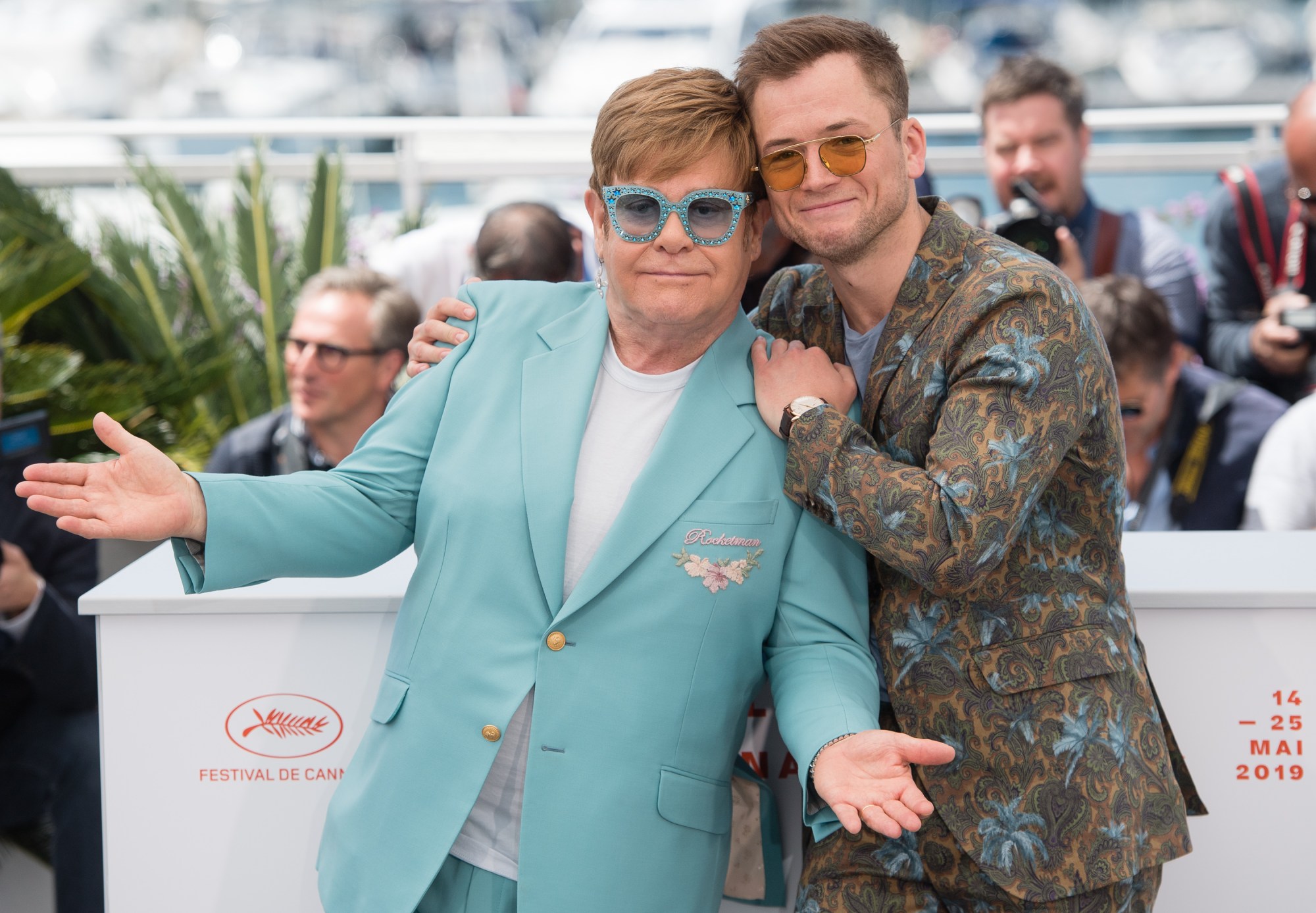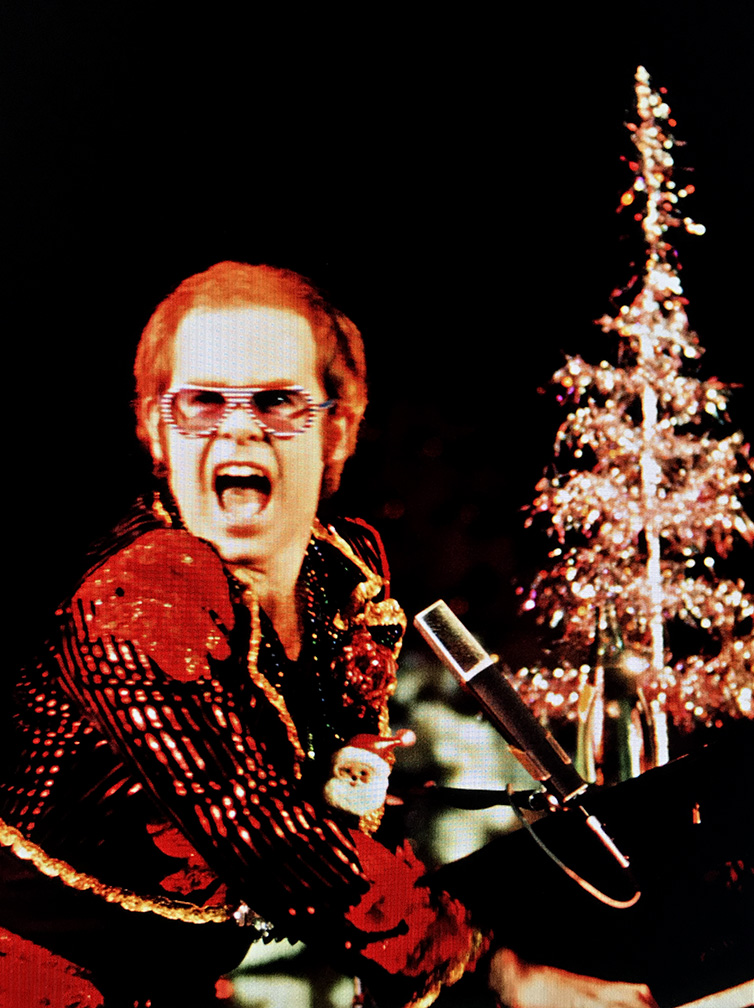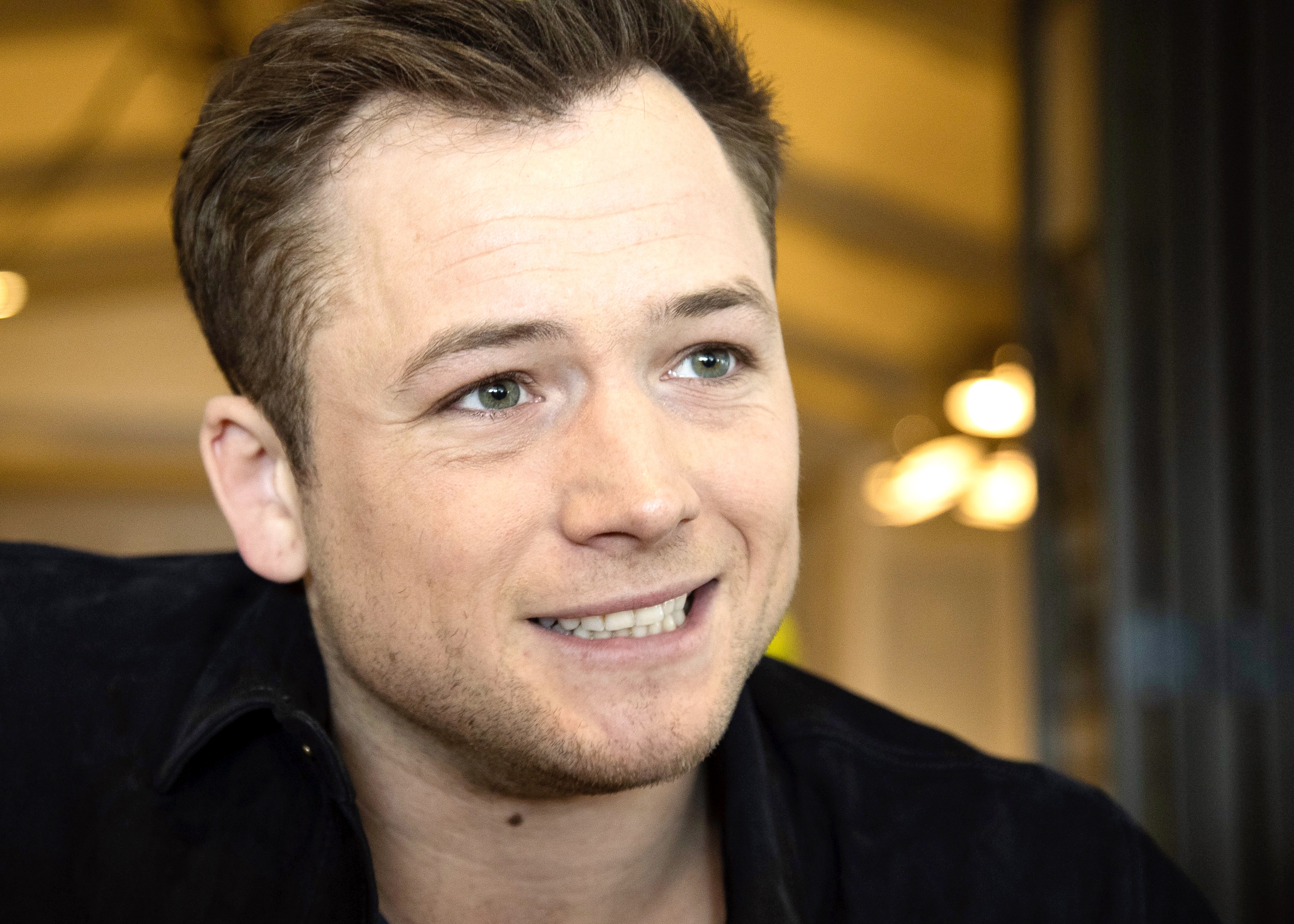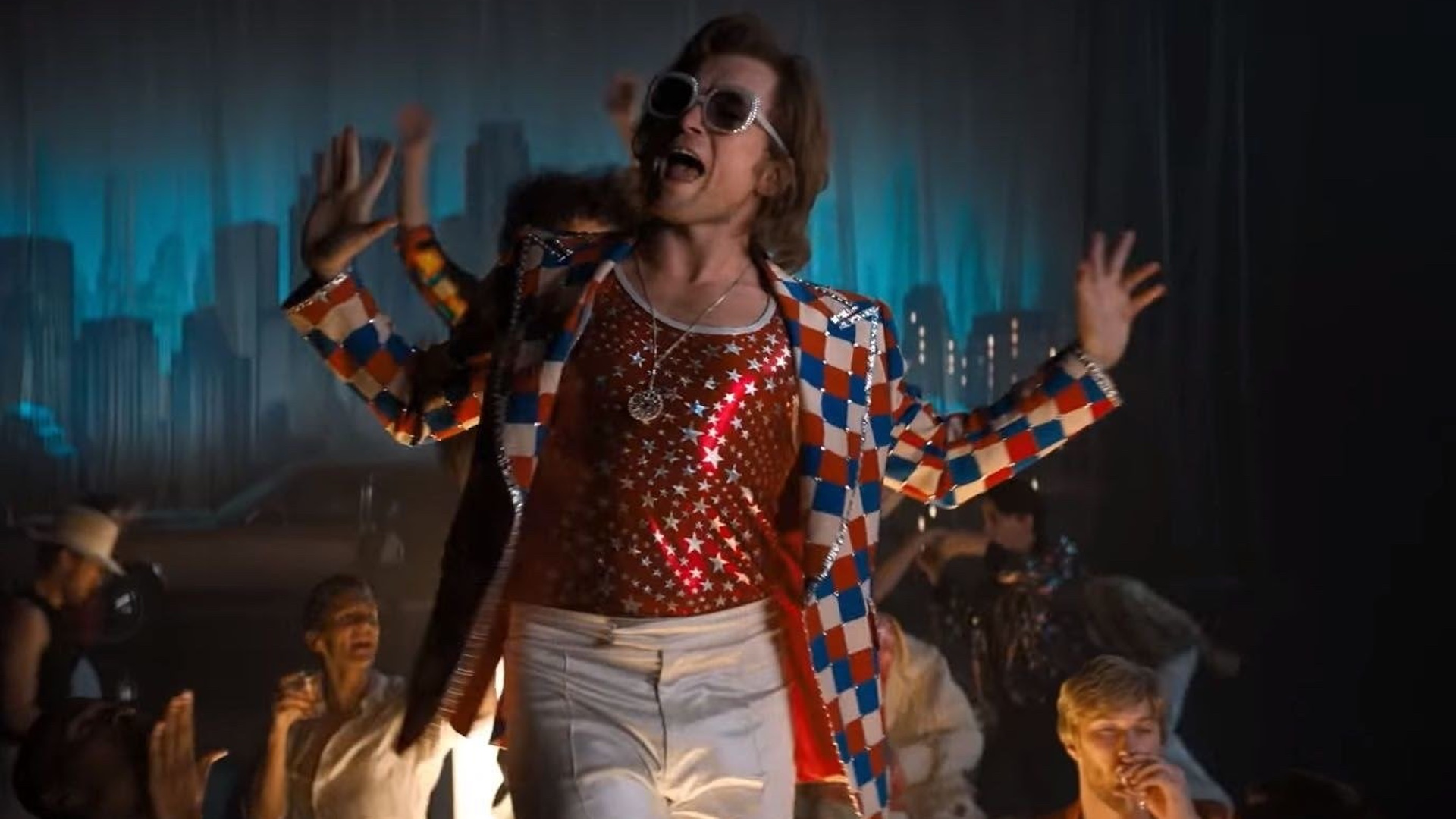
- Festivals
Elton & Taron & ‘Rocketman’
I was lucky to meet Elton John in London in October 1970 as I was starting my journalistic career. He had just returned from Los Angeles after his explosive American debut with 6 nights at the legendary West Hollywood Troubadour. The London press, which had ignored him until that moment, began to take notice and talk about him as their new British star.
His second album, simply titled ‘Elton John’, had been on my turntable very often. It opened with ‘Your Song’ that I played repeatedly.
I was young, working my way as a correspondent in a foreign country and that song was by far the most brilliant love song that I had ever heard. When Elton told me that he had opened the Troubadour show with ‘Your Song’ I easily became his admirer. He was also a gentle, kind man, not at all conceited by the recent adulation that America had thrown at him. He was 23 years old and had played with various bands around London since he was 17. Two years before he had composed the English song, performed by Lulu, admitted to the Eurovision Contest along with Bernie Taupin, a lyricist met by chance when he replied to an ad in New Musical Express looking for young composers. Since then the two have formed one of the most prolific pair of songwriters by composing hundreds of songs that have probably been a soundtrack of our last 50 years.
‘I met Bernie after writing the music for some of his lyrics,’ Elton told me then. ‘When I replied to that NME advert, they gave me a sealed envelope with some written lyrics of songs to be set to music. They were from Bernie and since then I have always played the new songs after composing them.’

Elton John performing in London, Christmas 1973.
armando gallo
This incredible story of love and friendship is now the leitmotif of the highly anticipated movie Rocketman, the tale of a chubby English teenager, kissed by a great talent to become a concert pianist as he abandons the classical music lessons to chase rock ‘n roll and to become one of the great pop stars of all times.
Welsh actor Taron Egerton, recently seen in Robin Hood and Kingsmen 1 and 2, plays Elton John with the full support of the English superstar and husband David Furnish, who has produced the film.
Before the world premiere at the Cannes festival on May 16th, we were treated to a sneak 14-minute preview of the film at the Troubadour on Santa Monica Boulevard, where Elton John’s career took off 49 years ago. At the presentation, Taron was visibly anxious but extremely happy after the euphoric reaction of the invited club audience ready to predict a success similar, if not superior to Bohemian Rhapsody which grossed over 900 million dollars. Rocketman’s director is Dexter Fletcher, an old friend of Taron’s, who had proved his passion and talented when he came to rescue and wrap Bohemian Rhapsody after the dismissal of Bryan Singer.
We were curious to know how Taron had managed the part, the singing, and the outrageous stage costumes (over 60 changes) and if the film will also dwell in the renown excesses of sex, drugs, and alcoholism that accompanied the stormy Elton John’s career up to the age of 43, when he entered a rehab clinic and cleaned up his amazing act.
‘We touched everything,’ Taron told us with a radiant smile. ‘Elton is a very open and honest person. He didn’t want anything to be sanitized. David Furnish is the producer and together they want the truth to emerge clearly on the screen.

Can we anticipate something of the script? How does the film begin?
The first scene is Elton who enters a rehabilitation center after yet another cocaine overdose. For me, it is extraordinary that this artist wants to show himself in such an intimate and vulnerable situation. I think it is rather unusual and immediately shows us what fabric Elton is and how much he is willing to share everything: the pain and the glory of the artist.
So, his notorious drug use is well documented?
Elton’s big demon has been with cocaine. He had a serious problem with it because it’s not something he could pick up and put down. I think as soon as it was in his system, it was all that he could think of. It’s tricky because I don’t know how much I’m supposed to say about his life. I know that he took so much that he had seizures and would carry on afterward. So, it’s not a glamorous and sexy drug. I think relationships with hard drugs like that compound your relationship with alcohol, and alcohol becomes problematic because it leaves you open and vulnerable to something like cocaine because you make bad life decisions. Anyway, when you see the film, you’ll see something of that part of his story. And for me, it was just something that was very important to make ugly because it is ugly. Cocaine is an ugly drug. Having spoken to him about his experiences with it just sounded fucking horrible. And I wanted that feeling. It’s such a difficult thing because it’s fundamentally a story about someone becoming well after having a real problem with drinking and drugs. That’s a difficult story to make joyous and celebrate. So that was always the challenge of it. Luckily, we have his music and that helps. The fact that it’s a musical means that we could cram the film full of his songs. So, we have, “I Want Love,” “Don’t Let the Sun Go Down on Me,” “Your Song,” “Tiny Dancer,” “Benny and the Jets.” All the big, well-known songs that you would want are in there. We’ve also managed to get in some of the stuff that I fell in love with, which was the stuff from the early seventies, which is super exciting. But that’s the film we wanted to make. For me, the two things that were important was that we would be frank about his relationship with substances and be frank about his sexuality and celebrate it as part of who he is. I feel that the film does that.
How did you get to know Elton?
We met on the set of Kingsmen and when they offered me the part, he invited me with my girlfriend to his house in Woodside several times. He wanted us to know each other well. He wanted me to ask him anything and then he made me a recommendation: to sing without imitating him. ‘I like your voice,’ he told me ‘I want to hear my songs with your voice.’ This was the best gift he could give me and made me feel immediately at ease for the rest of the interpretation.
The main challenge to play Elton?
For me the challenge has been about playing one person who is simultaneously the most confident, in command, tenacious person and someone who is phenomenally vulnerable and fragile and gentle and considerate and thoughtful and insecure, those things are difficult to marry and that’s been the challenge for me.

Jamie Bell plays the part of Bernie Taupin. How did you get along?
We have become great friends. Jamie met Bernie and confirmed that there was never a dispute between him and Elton. In the film, we put a small one (laughs) but these are licenses that are made for the sake of the film. Two friends who never fight: how boring!
Another ‘license’ is the opening of the Troubadour concert. It started with ‘Your Song’ but in the film, you used ‘Rocketman’, written two years later.
Exactly, but as I said, this film does not want to be a ‘biopic’, but a celebration of Elton John’s songs, his music and the imagination of Bernie’s lyrics. I hope it’s two hours of great entertainment.
In your encounters with Elton, is there anything that has remained with you?
So many things, and I feel compelled to keep them close because they are very personal, but one thing, in particular, I can share, when he told me: ‘My father has been dead for 20 years, and yet I’m still trying to impress him.’ I find it great. And that was a huge thing. And as an actor when a moment like that comes along, the feeling can become quite encompassing in terms of how you portray someone. And there is a scene in our movie, and it’s the last time Elton sees his father… played by Steven Mackintosh who’s a fantastic actor…and that was sort of ringing in my ears when we performed it and it helped personalize and humanize the whole thing. As an actor, he made me better understand how to interpret the man, before the artist.